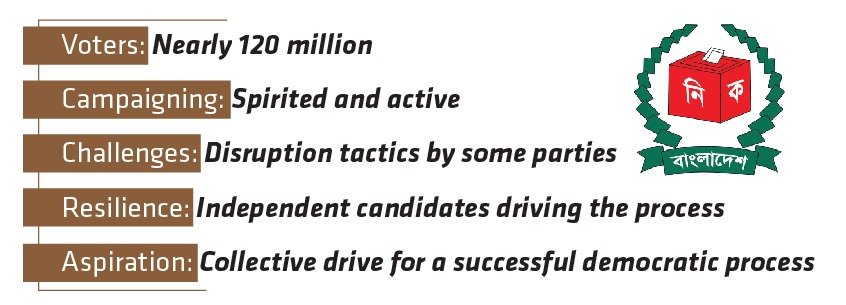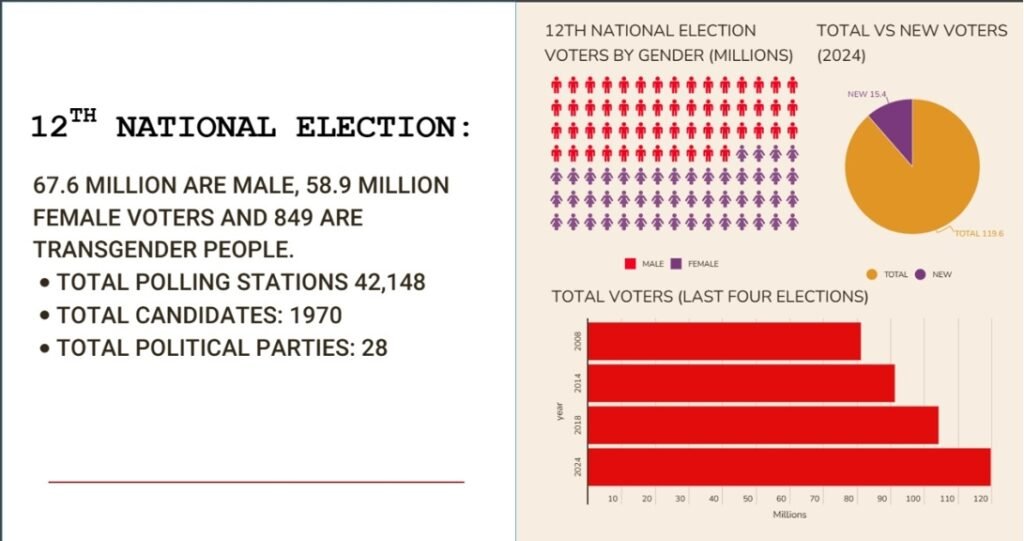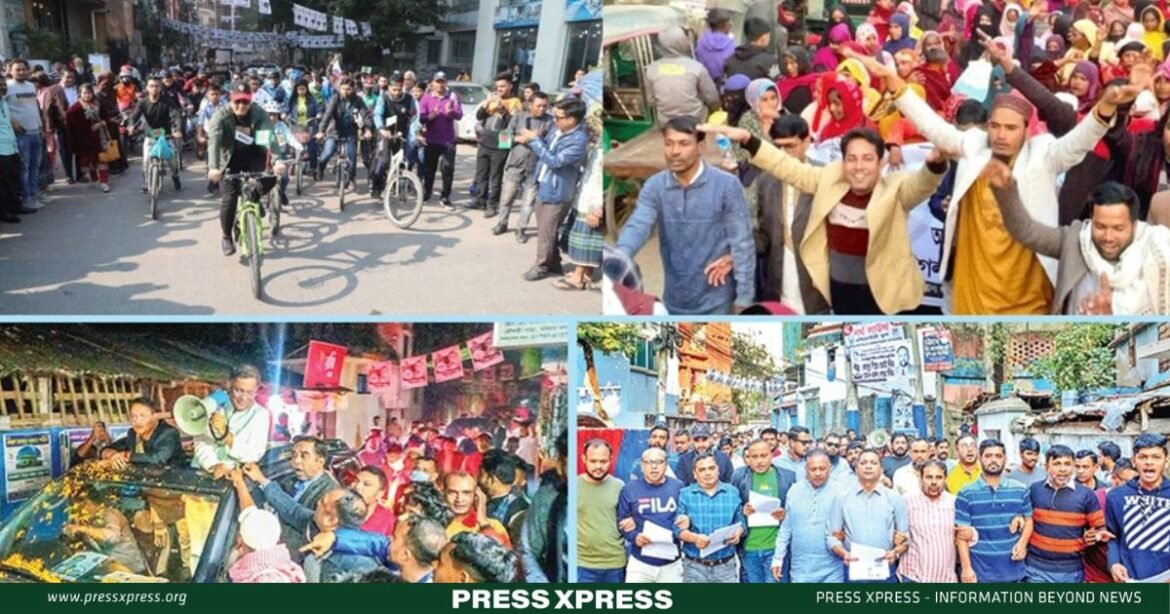As the 12th National election is knocking at the door, Bangladesh is spending a hectic time on the preparations for conducting a free, fair, and credible election.
With the election drawing closer, the atmosphere in Bangladesh is nothing short of celebratory. Citizens from urban centers to rural landscapes are enveloped in the infectious ambiance of democracy in motion.
Tomorrow (January 7), Bangladesh heads to the polls amidst heightened tensions. The major opposition and allied parties have enforced strict measures like shutdowns in protest of the 12th parliamentary election.
Leaders of the ruling Bangladesh Awami League and its supporters are urging voters to freely and confidently exercise their right to vote from the early hours of the day.
Conversely, Bangladesh Nationalist Party (BNP) leaders and their associates are calling for a boycott, intensifying the political divide.
The standoff has sparked widespread concerns as the lead-up to this highly anticipated national election, drawing global attention, is marred by disputes over the election process and marked by waves of unrest.
To ensure security, the army and other forces have been deployed to fortify a protective barrier around polling stations and throughout the nation.
At the moment our national hope is that the people will be able to have the best possible fair, free, and participatory election of worthy people to be members of our Parliament—leaders who will enact laws for the country that will help the citizens and the government for peace and progress.
Eagerly Awaiting Democratic Triumph
With nearly 12 crore voters ready to cast their ballots, the country is in the throes of spirited campaigning. Despite challenges posed by a few parties’ disruptive tactics, the resilience of independent candidates and the collective aspiration for a successful democratic process prevail.

Election Statistics
However, voting will occur in 299 out of 300 constituencies as the Election Commission (EC) has suspended the election for one parliamentary seat, Naogaon-2, due to the unfortunate passing of a candidate.
As per EC statistics, around 119.6 million voters, including 15.4 million new registrants, are anticipated to cast their votes nationwide from 8:00 am to 4:00
pm without interruption. Among these voters, 67.6 million are male, 58.9 million are female, and 849 identify as transgender individuals.

Comparatively, the number of voters in the 2018 11th parliamentary polls was 104.1 million, while the count was 91.1 million in the 2014 10th national elections, according to EC records.
A total of 1970 candidates, including 436 independents, representing 28 out of the 44 political parties registered with the EC, are contesting across 299 constituencies.
Notably, candidates nominated by the Awami League refrained from participating in the competition for 26 constituencies, leaving those parliamentary seats for their political allies, such as the Jatiya Party.
Reports indicate that the total number of polling stations for the 12th parliamentary election is 42,148. The election will utilize traditional paper ballots instead of electronic voting machines (EVMs).
Striving for Peaceful Elections
Assurances have been made for a peaceful electoral process, bolstered by the deployment of military forces to maintain law and order. Prime Minister Sheikh Hasina’s dedication to upholding electoral codes sets the tone for adherence to fairness. The Election Commission’s vigilance, evident in action taken against violators, reinforces its commitment to a just and peaceful election.
Hope for Democracy’s Victory
As the nation braces for election day, the hopes of millions are pinned on the triumph of democracy. The call for peaceful voting resonates, with the assurance that every citizen’s right to vote freely will be protected.
The forthcoming election isn’t merely a political event but a testament to the unwavering spirit of democracy in Bangladesh—a celebration of collective voices shaping the nation’s future.
Ensuring a Fair Playing Field
Efforts by the Election Commission (EC) stand firm to ensure an impartial and seamless election. Chief Election Commissioner Kazi Habibur Rahman’s commitment to integrity and reliability resonates in the Commission’s endeavors. Collaboration and open communication among stakeholders are actively encouraged, vital for a credible electoral process.
Despite the BNP-Jamaat alliance’s absence from the election, the public’s enthusiasm for exercising their right to vote remains undeterred. From urban centers to rural landscapes, an atmosphere of festivity surrounds the impending polls. While some engage constructively in campaigns, there are disruptive efforts by certain factions to disrupt the peaceful environment. Nevertheless, stringent measures by law enforcement maintain control.
International Oversight
The Election Commission’s commitment to neutrality and fairness is evident in its handling of candidate nominations. A watchful eye from international election observers underscores the global significance of Bangladesh’s democratic exercise.
Election Challenges and Security Concerns Heighten
The upcoming national election poses a significant challenge for both the Election Commission (EC) and the ruling Awami League.
Not just local but also international observers are closely monitoring the overall voting climate. A total of 127 international observers, with 60 already in Bangladesh, have been authorized by the EC to oversee the election proceedings. This attention stems from the keen interest of both local and global communities in Bangladesh’s political landscape and economic trajectory, as evidenced by extensive coverage in international media.
Security measures have been significantly heightened. Increased law enforcement, including police, RAB, armed forces, Border Guard Bangladesh (BGB), and Ansar and VDP members, have been deployed to ensure peace and order before, during, and after the elections.
Amidst this tense atmosphere, several political parties, including the BNP and its alliances, have called for a boycott, announcing plans for poll day activities, including a general strike. The BNP has declared a two-day strike over the weekend and urged citizens to observe a ‘mass curfew’ by staying home on polling day.
The fear of violence surrounding the national elections has prompted the deployment of army personnel across the country since January 3, maintaining duty until January 10.
In addition to the increased presence of police, BGB, RAB, and armed forces, over half a million Ansar and VDP members will be actively involved in election duties.
Furthermore, numerous candidates have withdrawn from the electoral race, citing the absence of a conducive environment for holding a credible election under the current political administration.


